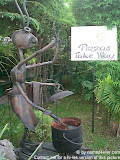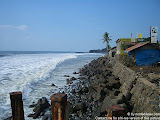 Flying kites is as old an tradition as mankind. Wikipedia says that kites were probably first invented about 3.000 years ago in China, made from materials like bamboo and silk. It’s a popular past time and pleasure activity in most countries around the globe, although I believe, that some Asian Countries truly have an obsession for it.
Flying kites is as old an tradition as mankind. Wikipedia says that kites were probably first invented about 3.000 years ago in China, made from materials like bamboo and silk. It’s a popular past time and pleasure activity in most countries around the globe, although I believe, that some Asian Countries truly have an obsession for it.
Here you not only see kids doing kiting – it’s a true science, involving the whole family. The usually warm air in Asia seem to help as well.
And then there are these little differences. If someone in Singapore tells you (singlish) to “go fly kite!” he actually means that you should get lost, ‘jump in a lake’ or just leave him alone. Otherwise when someone told you he was ‘flying kite’ all day, he means that he literally did nothing much productive. 
Hah! What a great idea for a Nomad!
Various types of kites
There are several types of kites, made of all kinds of materials like rattan, nylon, paper, foil, fiber glass and the mentioned bamboo or silk. Even different uses are recorded like scientific experiments (most well known Benjamin Franklin’s lightning experiments) or even military spy missions with man-lifting kites or as additional power sources for Cargo Ships.
Didn’t know about that though.
Then there are kites with one string (you just hang them into the wind) and others (more controllable) with 2 or even more strings. It can really get scientific! ![]()

Anyway, for me and plenty of other people it’s just a great hobby. I just love the 2-string kites for the figures you can fly with them and the level of control you can exercise.
It’s an amazing feeling to control your own kite in the strong winds and steer it through the blows and fly pirouettes, circles and sharp curves.
It probably goes back to my kindergarten years, where we even Years back I enjoyed kiting at the Baltic Sea in Germany or with friends at the coast of the North Sea close to Amsterdam in the Netherlands (right Steff, Dana, Jo?). ![]()
Kiting in Singapore and Bali
Both Singapore and Bali are great destinations to fly kite as well, mainly due to their close proximity to the Open Sea, with their ever blowing winds. In Singapore you can fly a kite best at the Marina area, as there is a great wide open space with great wind coming from the southern shore. You will find plenty of other people occupying the open space (after all, it’s a designated place for playing soccer), so either come early or very late. Avoid the weekends though, as it’s packed with family picnics and other hordes of people.
The East Coast park or the area around Changi Village isn’t bad either, although you have to watch out a bit more for electricity lines and especially trees (see picture above). 
Another thing to avoid is kiting around lunch time, when it’s a very hot and sunny day; as you could experience heavy sunburn within 20 minutes, even though you used lots of sunscreen. Dehydration is another danger, so bring plenty of water or other liquids to replenish yourself. If you are getting headache or starting to experience blackouts, it might be too late though. No kidding, really! ![]()
Cultural Strings
In Bali, like the Ogoh Ogohs, flying kite is truly a cultural thing. You can buy them for cheap money at almost every corner in all kinds of sizes, colours and shapes.
 Or they are build by the respective owners themselves, which leaves them even more proud!
Or they are build by the respective owners themselves, which leaves them even more proud!
Kites are told here to hold bad spirits at bay as well, so there is even a useful purpose besides the pleasure factor.
Now, at the end of the rainy season the skies are filled with kites all over Bali. They start early in the morning and even at sunset you can still see their silhouettes everywhere (see picture to the right).
They have even competitions here, where the owners of kites fight with each other trying to to snag each other’s kites or cut other kites down. To do that their strings are passed through a mixture of ground glass powder and glue. The resulting strings are very abrasive and can sever the competitor’s strings or even damage their kites.
To some kites even blinking lights are attached, which make up for an even more impressive experience.
With the internet full of sites, dedicated to selling building kits and kite plans, the World Sport Kite Championships and even the American Kitefliers Association, Kiting really seems to be something big, real serious and much more than just a relaxing hobby.
So, what do you think?
Child’s play, pleasant recreational activity or complete waste of time? ![]()
or save article to your Facebook with 1 simple click:




May 24th, 2007 at 7:21 pm
Could be fun and you might make some new friends.
May 27th, 2007 at 5:43 pm
When i was on vacation thirty years ago with my parents at the coast of the eastsea in westgermany my Kite flew away over the eastsee to eastgermany, my dad said : Now your kite is visiting our friends in the east ! So guess what i felt as a small boy in this situation ? : Flying kits sucks !
May 28th, 2007 at 1:45 pm
Sounds like a funny and relaxing way to spend your time
Might just give it a try in a sunny sunday afternoon!
Cheers,
May 29th, 2007 at 4:39 pm
Kite flying is a very popular activity in Pakistan especially in the province of Punjab. An annual festival (called Basant) is held in Spring every year. People throng to Lahore, the capital of Punjab, for this festival. Kites are flown from rooftops and championships are held all over. The idea is to cut the string of the opponents kite.
June 7th, 2007 at 2:21 pm
When we were young, our father would build kites for us small children. Summer here would start in April and ends in May – very good time to fly kites as it is vacation time (no school). There is that nostalgic feeling I would encounter everytime I see kites. Here in Manila, I have heard of flying kites and some competitions to be held in Manila’s popular spots like the Rizal Park, etc. I just miss it this year as I had been very busy…
You’re blogging about kites rekindled my interests in them
May 28th, 2008 at 10:39 pm
[…] String causes Helicopter to make Emergency Landing – As you may know by now, Kiting is not only a favorite waste of time, but a cultural heritage in Bali. So much so, that you […]